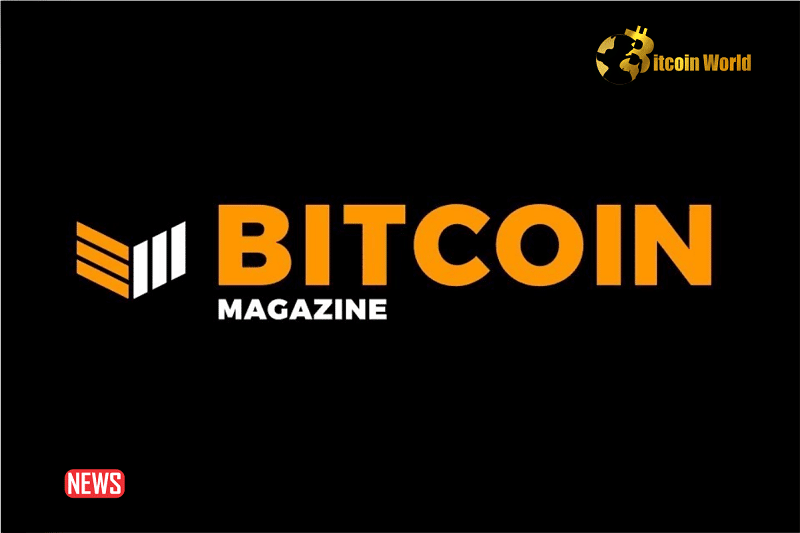Hold onto your hats, crypto enthusiasts! A David-versus-Goliath legal battle is brewing, and it’s got the entire Bitcoin community buzzing. Bitcoin Magazine, a prominent voice in the crypto world, has found itself in the crosshairs of none other than the US Federal Reserve. Yes, you read that right – the Fed is suing Bitcoin Magazine!
Why is the Fed Suing Bitcoin Magazine?
The lawsuit isn’t about Bitcoin Magazine’s insightful articles or market analysis. It all boils down to parody products. Bitcoin Magazine, known for its sometimes cheeky and critical stance on traditional finance, created merchandise featuring the FedNow Service logo. FedNow, for those unfamiliar, is the Fed’s new instant payment system.
According to the Fed, Bitcoin Magazine’s use of the FedNow logo on its products constitutes trademark infringement and falsely suggests an affiliation with the central bank. But Bitcoin Magazine isn’t backing down. They argue it’s all protected under the First Amendment – a fight for free speech and the right to critique the system.
Fed’s Claim: Unauthorized Infringement
The Federal Reserve’s legal action, as reported by Bitcoin Magazine itself, alleges “unauthorized infringement.” They claim the parody products, using the FedNow Service image and brand, mislead consumers into thinking Bitcoin Magazine is somehow connected to or endorsed by the Federal Reserve.
However, Bitcoin Magazine’s Editor-in-Chief, Mark Goodwin, sees it differently. In an open letter addressed to the Federal Reserve Financial Services’ Deputy General Counsel, Goodwin didn’t just acknowledge the Fed’s concerns – he doubled down, asserting the publication’s right to criticize and satirize the FedNow system. He highlighted concerns about potential civil liberty infringements tied to FedNow, emphasizing Bitcoin Magazine’s First Amendment protection to voice these concerns.
Read Also: MicroStrategy’s Michael Saylor: You Can Never Have Too Much Bitcoin
The First Amendment at Stake?
Bitcoin Magazine is standing firm, arguing that their parody is clearly social commentary and protected speech under the First Amendment. They contend that the products are designed to critique the surveillance aspects and potential implications of the FedNow system on personal freedoms.
In his open letter, Goodwin stated:
We don’t think anyone who is familiar with our editorial policies and overall worldview would ever equate Bitcoin Magazine with the Federal Reserve. We concur with you that “no such association or relationship exists.” We look forward to protecting our First Amendment rights, as well as the opportunity to demonstrate to all Americans the difference between Bitcoin’s open, free, and decentralized financial system and the centralized FedNow system, which threatens our nation’s basic ideals.
Here’s a breakdown of Bitcoin Magazine’s key arguments:
- Parody is Protected Speech: They believe their use of the FedNow logo falls under parody, a form of expression legally protected by the First Amendment.
- No Consumer Confusion: Bitcoin Magazine argues that their readership, familiar with their critical stance on centralized systems, would not mistakenly believe they are affiliated with the Federal Reserve.
- Critique of FedNow: The products are intended as social commentary, specifically targeting concerns about surveillance and centralization inherent in systems like FedNow.
This legal clash highlights a fundamental tension:
| Intellectual Property Rights (Fed’s Perspective) | Freedom of Expression (Bitcoin Magazine’s Perspective) |
|---|---|
| Protects trademarks and brand identity from unauthorized use. | Guarantees the right to criticize and comment on public institutions and systems. |
| Aims to prevent consumer confusion and protect the reputation of the FedNow service. | Essential for public discourse and holding power accountable. |
| Enforces legal boundaries to prevent misuse of official symbols. | Allows for satire and parody as legitimate forms of social and political commentary. |
What’s Next and Why It Matters
The outcome of this lawsuit will be closely watched by both the crypto community and free speech advocates. It could set a precedent for how parody and criticism of government institutions are treated under trademark law. Will the courts side with the Federal Reserve’s right to protect its brand, or will they uphold Bitcoin Magazine’s First Amendment right to parody and critique?
For the crypto world, this case resonates deeply. Bitcoin and decentralization are often seen as alternatives to traditional, centralized financial systems like those controlled by the Fed. Bitcoin Magazine’s stance reflects a broader sentiment within the crypto community that values open dialogue and skepticism towards centralized power.
Meanwhile, in the broader crypto market, Bitcoin (BTC) experienced a slight dip. After briefly rebounding to the mid-$35,000 range, it has retraced below this level and is currently trading around $34,700, marking a 0.5% decrease in the last 24 hours. While seemingly unrelated to the lawsuit, market fluctuations are always on the radar for crypto enthusiasts.
In Conclusion: A Battle for Principles
The legal showdown between the US Federal Reserve and Bitcoin Magazine is more than just a trademark dispute. It’s a clash of principles – intellectual property versus free speech, centralized power versus decentralized critique. The case will test the limits of protected speech in the context of parody and social commentary, and its resolution will have significant implications for both the crypto space and the broader landscape of free expression. Stay tuned, as this is a story that is sure to unfold with significant ramifications.
Disclaimer: The information provided is not trading advice, Bitcoinworld.co.in holds no liability for any investments made based on the information provided on this page. We strongly recommend independent research and/or consultation with a qualified professional before making any investment decisions.




